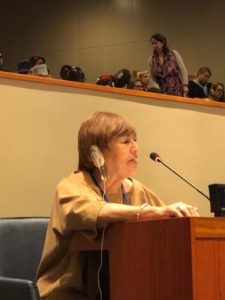Review of SDG 4: “Quality education must be centered on people and their dignity”
July 10, 2019
In the review of SDG 4 in the United Nations, the vice president of the Global Campaign for Education (GCE), Madeleine Zúñiga, highlighted that a lifelong transformative education must consider diversity and have solid teacher training and adequate funding.
Yesterday, the review of the Sustainable Development Goal number 4 (SDG 4), about education, was initiated at the United Nations, within the framework of the High Level Political Forum, which takes place until July 18 in New York, USA.
Three hours of debate were dedicated to look at the situation of the right to education worldwide with the participation of representatives from different countries, as well as from different sectors of civil society, among them indigenous people, children and youth, Lesbian, Gay, Bisexual, Trans and Intersex (LGBTI) people and persons with disabilities.
“The diversity of civil society representatives and interventions emphasized an intersectoral perspective of education, which represents a fundamental advance comparing to the debates on the 2030 Agenda that took place in previous years,” said Camilla Croso, general coordinator of the Latin American Campaign for the Right to Education (CLADE), which accompanies the event in New York.
The participation of GCE vice president and coordinator of the Peruvian Campaign for the Right to Education (CPDE), Madeleine Zúñiga, was another highlight of this first panel on SDG 4. In her speech, she pointed out that “education is a powerful instrument to transform lives and, therefore, transform the world; not any education, but one that promotes sustainable development, social justice, truly democratic societies, global citizenship and the culture of peace that the whole world requires.”

Madeleine Zúñiga emphasized that a quality education must be centered on people and their dignity, assuming the multiple dimensions of diversity to design models and relevant strategies according to the characteristics of different societies. She added that it is fundamental to ensure the right to lifelong education and solid teacher training, within the framework of human rights and comprehensive and muti-sectorial educational attention; as well as bigger and better investment in public education.
“That requires a substantive improvement of tax rules and a strong political will to fight against tax evasion and avoidance, and to achieve tax justice, as well as to face the increasing privatization, an unregulated process that is allowing profit interests in education. Low-cost and low-quality private schools, with poorly paid teachers, not only violate the right to education, but also deepen the inequalities,” she said.
Related Content





